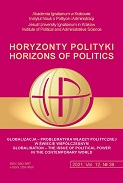Koncepcja smart university na przykładzie Uniwersytetu Wrocławskiego
The Concept of Smart University Based on the Example of the University of Wrocław
Author(s): Mateusz Bartoszewicz, Paula WiśniewskaSubject(s): Higher Education , State/Government and Education
Published by: Uniwersytet Ignatianum w Krakowie
Keywords: smart university; research university; University of Wroclaw; IDUB;
Summary/Abstract: SCIENTIFIC OBJECTIVE: The Authors intended to identify the convergence of the directions of strategic development of the University of Wroclaw with the determinants of the smart university concept. The objective was achieved by comparing selected categories of the smart university model with the assump tions of the IDUB project application prepared by the University of Wroclaw. The article answers the following research questions: To what extent do the planned activities included in the IDUB project fit into the smart university concept? Which planned activities characterized in the project deviate from the smart university concept? PROBLEM AND RESEARCH METHODS: The study was exploratory. Authors have applied a hybrid approach, related to the method of idealization and concretization. The following research methods were used: critical analysis, desk research, qualitative content analysis, structured interview technique and unstructured, anonymized interviews. EXECUTIVE PROCESS: The article consists of three parts: the first section explains the methodological assumptions of the research, the second section characterizes the issue – what is the concept of smart university. The third chapter describes the historical background and development potential of UWr, while the fourth part of the article contains the results of the analysis of IDUB application. The last chapter contains both: conclusion and summary. RESULTS OF THE SCIENTIFIC ANALYSIS: The content of the IDUB project application prepared by UWr explicitly includes elements, that con tribute to the formation of smart & internationalization based: [1] science, [2] didactics, [3] infrastructure, as well as improve [4] cooperation with the socio-economic environment and [5] improve university management. However, authors haven’t detected any clearly defined [6] tools for the implementation of pro-community activities that were not explicitly oriented towards “hard” indicative evaluation. CONCLUSIONS, INNOVATIONS, RECOMMENDATIONS: The most probable reason for the failure to find clearly specified tools for the implementation of pro-community activities was the fact that the Ministry of Science and Higher Education did not foresee funds for this type of activities in the conditions of the competition. The analysis could be extended to the other nine (from ten) winning universities. Further research should also be conducted in the context of analyzing the mechanisms implemented under the IDUB project. In addition, an evaluation of the program will be necessary after 2026. A serendipitous result of the conducted research was the observation that the problem facing Polish universities “at the turning point” of the evolution of the liberal model into an entrepreneurial one – is the issue of inflexible management structures replicated for decades.
Journal: Horyzonty Polityki
- Issue Year: 12/2021
- Issue No: 39
- Page Range: 179-199
- Page Count: 21
- Language: Polish

